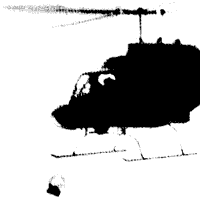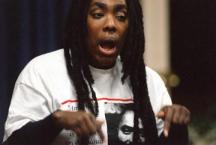

Romona Africa (only surviving adult MOVE member)
Why did the City of Philadelphia drop a bomb on a row of houses and let the fire burn for over an hour? What led the city to commit acts of war upon its own citizens? Was the city - or even the federal government - determined to wipe out MOVE? To answer these questions, it is necessary to understand who MOVE is. While not all black, they all take the surname " Africa ." Some call them radicals, lunatics, or terrorists.
One award-winning journalist, however - death-row prisoner Mumia Abu-Jamal - gave a different description: "MOVE is a family of revolutionaries, of naturalist revolutionaries, founded in Philadelphia in the late sixties/early seventies, who oppose all that this system represents. For years in Philadelphia, there's been continual and unrelenting conflict between the MOVE organization and the city - that is, the police, the judiciary, and the political arm of the system. They have fought it bitterly.”
The City of Philadelphia 's first major confrontation with MOVE came in 1978, when Mayor Frank Rizzo, who liked to brag that his police force could successfully invade Cuba , ordered police to surround MOVE's house in the Powelton Village section of the city. On 8th August, gunfire erupted at the barricaded house, killing Police Officer James Ramp with a bullet through his neck.
Nine MOVE members were tried and convicted of third-degree murder; all nine were sentenced to 30 to 100 years. But not only do they deny shooting the officer, saying he was hit by his own colleague's bullet; they also demand to know how nine people could all shoot one man with one bullet. In the six years after the shoot-out, nevertheless, police seemed to be waiting for the chance to even the score.
Fast forward seven years to 1985: All nine convicted MOVE members were still in prison. Other members had moved into the house on Osage Avenue , which they had fortified with planks out of the belief that they needed to protect themselves from further attack by the city. They committed themselves above all to vociferously demanding the release of their incarcerated brothers and sisters. To this end, they installed a high-powered loudspeaker on the front of their house, and used it to broadcast their attacks on the city.
Neighbours began petitioning the city to evict the group, claiming they disturbed the peace and created health hazards by keeping stray animals in the house. Little did neighbours suspect that the city would respond to disturbing the peace and sanitary code violations by bombing the house in question and burning down the entire neighbourhood.
But according to Ramona Africa, neighbours' complaints only gave the city an excuse to do what they had been itching to do for years. Ramona tells it this way; "What the May 13 bombing and confrontation were about was the fact that MOVE people had nine sisters and brothers who had been in jail since 1978 for a murder they did not commit.”It started on Mother's Day, Sunday, May 12th of 1985. We were listening to the radio, and they started talking about cops gathering at Cobbs Creek Park , basically for a showdown with MOVE. That's when we first heard about it. Slowly but surely the block was being evacuated. People were leaving; cars were being removed from the block. We were listening to all of this on the radio. What we were planning was to protect ourselves as much as possible, and toward that end, late that night I took all the kids down into the basement, because that was the strategy, that's where we were supposed to go.
Ramona goes on: “The first thing that happened was they trained deluge hoses on the house. The water was just pouring down into that basement. It had to be from the roof down. After an hour or two, that stopped. Then, they claim, they tried to insert tear gas, they wanted to breach three-inch holes in the party walls on both sides of our house to insert tear gas. Well, 'breach' to them meant to explode, to blow holes in the walls. And by the time they finished their explosions, they had blown the whole front of the house off. Then they did fill as much of the house as possible with tear gas.
"When that didn't work, they shot over ten thousand rounds of bullets at us - according to their own estimate. At one point they used up all their ammunition and had to send back to the armoury for more."
As in the 1978 confrontation with MOVE, the city claimed MOVE members inside the house fired first - but when city workers combed the debris the next day, they found no trace of the automatic weapons the police had accused MOVE of firing to initiate the battle.
Ramona describes the calm before the fire storm: "After the shooting, it was quiet for a long time. I guess that's when they were preparing this bomb. They want to call it an 'entry device' or put some name on it that will soften the context, but you can't soften the context of what they did. At 5:27 or so on the afternoon of May 13, they dropped that bomb on the roof of the house, and it ignited a fire."
Ramona recounts the city's reaction - or lack of it - to the spreading fire: "The Fire Department had been out there from the beginning. they're the ones who had trained the deluge hoses on our house and poured tons of water down on us. But when that bomb ignited that fire, they made the decision that they weren't going to fight it, they weren't going to extinguish it: they were going to let it burn, knowing that innocent men, women, and babies were in that house. Innocent not just by my standards, but by their standards - we had not been convicted of any wrongdoing. But they decided to let that fire burn on innocent people."
The next day, Mayor Goode claimed that fire fighters had been prevented from fighting the inferno by MOVE members who had escaped from the house into a back alley, from where they shot at fire fighters. But the water cannons that had poured 640,000 gallons of water on the house had been unmanned. At the next day's press conferences, Mayor Goode and Police Commissioner Sambor, contradicted each other about whether police had fired on MOVE members coming out of the back of the house. The mayor appeared startled that Sambor was admitting to the firing. Whereupon an aide stepped in to inform Sambor that the police had not fired any shots at escaping MOVE members after all.
Mayor Goode, who after the bombing described the whole operation as, "perfect - except for the fire," also garnered the praise of Los Angeles Police Commissioner Daryl Gates, who called Goode, "an inspiration to the nation. I hope he runs for national office. He certainly made my heroes list - and that's not a long list." Frank Selgrath, editor of the police union newspaper, Peace Officer, boasted that "every action was taken to see that there was no loss of life or property."
Since her release from prison in 1992, Ramona Africa has once again been spearheading MOVE's crusade to free their nine brethren imprisoned for the 1978 shooting of Officer James Ramp. She said; "The issue now, as then, is our family in prison. We are not going to sit back and watch our innocent family members rot in prison for something we know they didn't do and that the government knows they didn't do." Ramona says her purpose in suing the City of Philadelphia in federal court now is to draw attention to the continued oppression of MOVE members by police and government.
 e-mail:
e-mail:
 Homepage:
Homepage:
Comments
Hide the following comment
Re: Word Choices and Presentation of the Facts
31.07.2007 23:57
I refer to the following: "Frank Selgrath, editor of the police union newspaper, Peace Officer, boasted that "every action was taken to see that there was no loss of life or property." The quote is an out of context restatement by the author of a conversation regarding the official statement from the Philadelphia Police Department on the incident.
This statement does not convey the personal ffeeling of sadness that he and many individuals experienced when hearing about the loss of life(lives) of the people inside, and behind the movement. There is no one in my family that would feel boastful or have pride in hearing about the loss of life of another human being. Everyone in my immediate family felt for the people who were killed in this terrible ordeal, and were touched by unfathomable grief for their families and friends.
Dorothy Selgrath